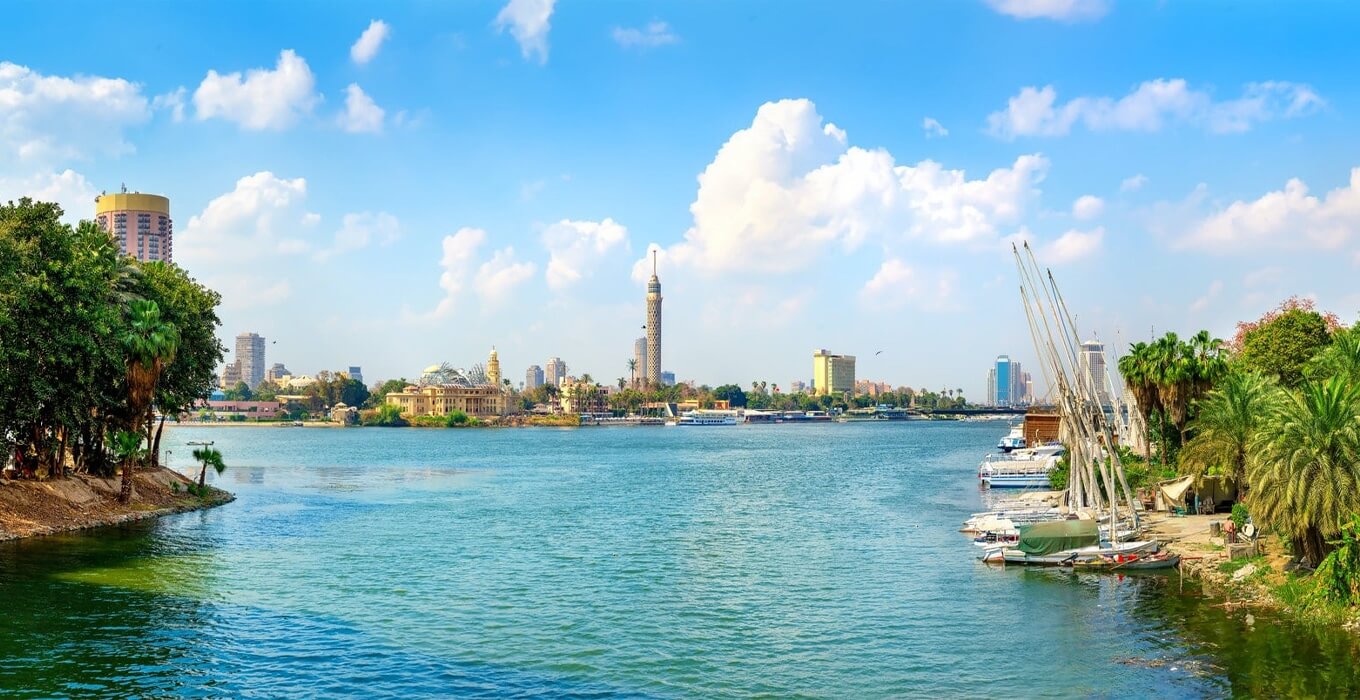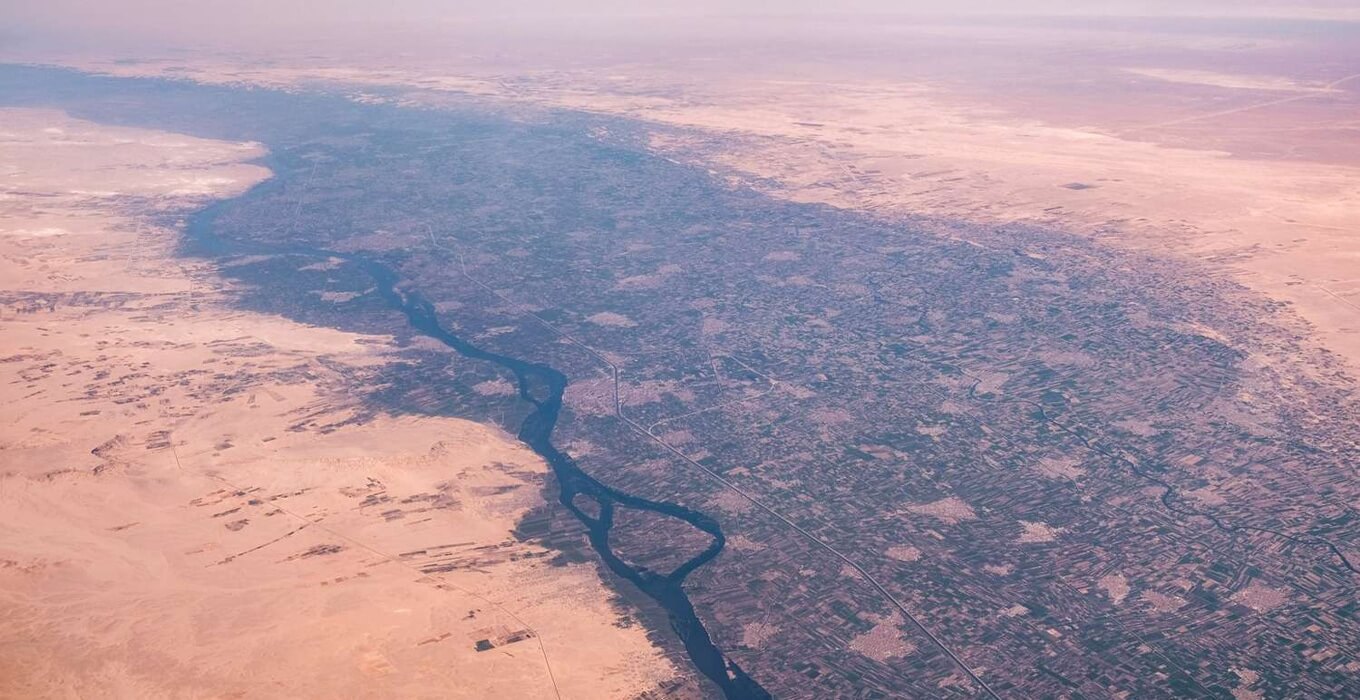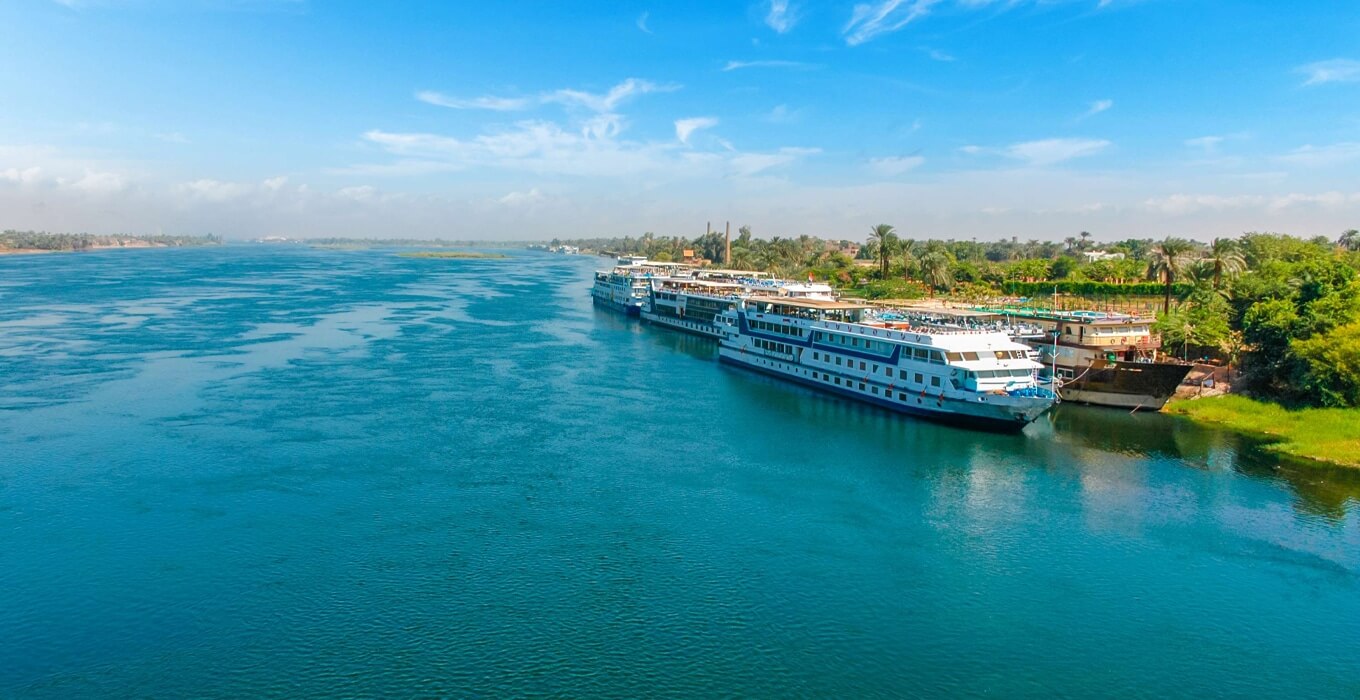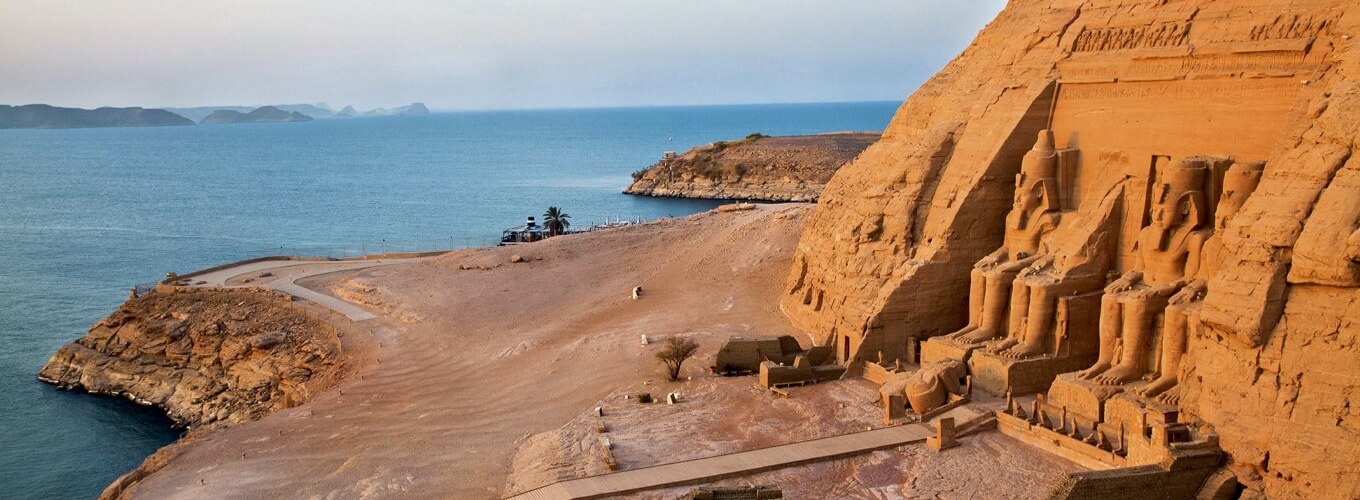The Nile River is called the “lifeblood of Egypt.” It has shaped Egypt’s history and growth. The Nile’s story involves human creativity, cultural change, and the deep connection between people and nature.
Key Takeaways
- The Nile River was key to ancient Egyptian life. It gave them the water and fertile soil to build great monuments and survive for thousands of years.
- The Nile’s annual floods were crucial to Egyptians. They developed advanced irrigation to use the river’s power. This turned the desert into a fertile area.
- The Nile was important in Egyptian myths. Gods like Osiris, Isis, and Anubis were linked to the river’s meaning and religious importance.
- The Nile’s impact wasn’t just in ancient times. It still shapes Egypt’s economy and helps feed its people and agriculture today.
- Discoveries and deciphering ancient texts like the Rosetta Stone have helped us understand ancient Egypt. This has shown us the lasting impact of the Nile on their civilization.
Take advantage of our discounted offers with the following All-Inclusive Vacations to Egypt:
- 7-Day Cairo with Nile Cruise Tour Package Get -100 USD
- 8 Days Cairo with 3 Nights Nile Cruise by Flight Get 10% Off + Free Activities
- 8 Days Cairo and Nile Cruise Holidays with Abu Simbel Get 7% OFF
- 10-Day Cairo, Alexandria, and Nile Cruise with Abu Simbel by Flight Get 10% OFF
- 12-Day Cairo City & Nile Cruise and Hurghada City
Cradle of Civilization: The Nile’s Role in Ancient Egypt
The Nile River was key to ancient Egyptian life. It gave them the fertile land and water they needed. This led to one of the most advanced ancient cultures.
The Nile’s yearly flooding brought nutrient-rich silt. This made the fertile Nile Valley and Delta perfect for farming and culture.
Fertile Nile Valley and Delta
The Nile Valley and Delta were very fertile. The yearly Nile River flooding brought nutrient-rich sediment. This made the land great for ancient Egyptian agriculture.
This flooding and renewal cycle helped create a great civilization. It was one of the earliest and most advanced in history.
Annual Nile Floods and Irrigation Systems
The ancient Egyptians used the Nile’s power with smart irrigation systems. They built canals, dams, and more to manage the water. This made sure they had enough water for their crops and people.
The yearly Nile River flooding was a big deal in Egyptian culture and mythology. People celebrated the river’s power and the good harvests it brought.
| Importance of the Nile River in Ancient Egypt | Impact on Ancient Egyptian Civilization |
| Provided fertile land for agriculture in the Nile Valley and Delta | Allowed for the development of a thriving, advanced civilization |
| Reliable source of water for irrigation and drinking | Enabled the growth of large population centers and cities |
| Annual flooding deposited nutrient-rich silt, replenishing the soil | Supported the cultivation of diverse crops and agricultural practices |
| Facilitated transportation and trade along the river | Played a crucial role in the economic and cultural development of ancient Egypt |
Discover the wonders of Egypt with our unforgettable Egypt Nile cruises! Book now

Origins and Exploration of the Nile River
The Nile River, the longest river in the world, has always caught the eye of explorers and scholars. Its secrets and vast area have made it a mystery for centuries. Many have tried to find where it starts, sparking debate and interest.
Ancient Egyptians and others had many ideas about where the Nile river comes from. They thought it might come from a mythical lake or lakes. But as explorers and map makers went deeper, they found the truth about this big river.
One big step in understanding the Nile river was finding its farthest source in the 1800s. Explorers like Richard Burton, John Hanning Speke, and David Livingstone mapped the river’s path. They found it started in the highlands of East Africa.
The Nile delta is also very interesting. The river’s floods and sediment have made the Egyptian land fertile. This has helped ancient Egyptian farming and civilization grow.
Now, finding out more about the origins of the Nile and its discoveries still excites researchers. They are learning more about the river’s important role in Egypt’s history and growth.
Ancient Egyptian Mythology and the Nile
The Nile River was very important in ancient Egyptian mythology and religion. It was seen as the source of life and fertility. The river’s floods every year were linked to the Egyptian gods and deities.
Hapi was a key god linked to the river’s floods. He made sure the land was fertile.
Nile River Deities and Legends
The Egyptians told many legends about the Nile’s start, its link to the afterlife, and the gods of its waters. These mythological stories were a big part of their culture. For example, Osiris was a big god linked to the Nile and its power to give life.
- Hapi: The god of the annual Nile floods, ensuring the fertility of the land.
- Osiris: The god of the afterlife, strongly linked to the Nile’s regenerative power.
- Anubis: The jackal-headed god who presided over the embalming process, guiding the deceased into the afterlife along the Nile.
- Sobek: The crocodile-headed god, seen as both a protective and destructive force of the Nile.
These Nile River deities and their stories were key to ancient Egyptian life. They influenced their beliefs, customs, and art for a long time.
| Nile River Deity | Role and Significance |
| Hapi | God of the annual Nile floods, ensuring the fertility of the land. |
| Osiris | God of the afterlife, strongly linked to the Nile’s regenerative power. |
| Anubis | Jackal-headed god who presided over the embalming process, guiding the deceased into the afterlife along the Nile. |
| Sobek | Crocodile-headed god, seen as both a protective and destructive force of the Nile. |
Explore Egypt’s wonders on a Luxury Dahabiya Nile Cruise. Enjoy exclusive, intimate experiences with stunning views and personalized service. Book now!
What is the history of the Nile River in Egypt?
The Nile River has been key to ancient Egypt for thousands of years. It helped shape one of the world’s earliest and most important civilizations. This river, over 4,100 miles long, was crucial for the growth of ancient Egypt and the Nile civilization.
The Nile’s floods each year brought fertile land and irrigation for farming. This was vital for the pharaohs and pyramids of Egypt. These floods and the river’s role in Egyptian mythology were central to their culture and beliefs.
The Nile did more than just feed the land. It was a key route for trade, communication, and moving people and goods in the Nile Valley. Its importance is seen in the many deities and legends tied to it, like the god Hapi, who symbolized the Nile’s floods.
“The Nile is more than a river in Egypt – it is the very essence of the land itself, the lifeblood of its people and the foundation of its ancient civilization.”
The Nile’s impact is still seen today, through things like the Rosetta Stone. This stone and other finds help us understand ancient Egyptian culture and society. From the start of the Nile civilization to today’s water issues, the Nile’s story is tied to Egypt’s.

Pharaohs, Pyramids, and the Nile Civilization
The ancient Egyptian civilization thrived by the Nile River. This river was the heart of their world. The pharaohs, seen as gods, used the Nile to build amazing engineering marvels.
Engineering Marvels Along the Nile
The Nile River flooded every year, giving life to the ancient Egyptians. They used this to build pyramids, big temples, and smart irrigation systems. These show how smart and resourceful the Nile civilization was.
- The Pyramids of Giza, like the Great Pyramid, were made from the Nile’s limestone and granite.
- Big canals and dams were built to use the Nile’s power. This helped with irrigation and grew the population and economy.
- The Nile’s floods were watched and managed closely. This helped the Egyptians develop new farming techniques and make the most of the fertile land.
The Nile River was more than just a source of food. It was the reason behind the cultural, economic, and architectural achievements of the ancient Egyptian civilization.
Nile River’s Influence on Agriculture and Economy
The Nile River was key to ancient Egypt’s farming and economy. It gave them the water and rich soil they needed to grow many crops. The Nile floods every year making the land fertile. The Egyptians used smart irrigation techniques to bring the river’s water to their fields.
This farming helped Egyptian cities grow, their trade networks, and their social and political systems. The Nile was vital to ancient Egyptian culture and Egyptian civilization. It was the base of their rich society.
| Crop | Importance |
| Wheat | Staple food and a crucial component of the Egyptian diet |
| Barley | Used for brewing beer, a popular beverage in ancient Egypt |
| Flax | Cultivated for its fibers, which were used to make linen cloth |
| Fruits and Vegetables | Diverse range of produce, including grapes, figs, onions, and lettuce, contributed to a well-balanced diet |
The Nile River’s importance to Egyptian agriculture and the economy is huge. It was the heart of this ancient civilization. Its impact is still seen today.
Rosetta Stone and Unlocking Ancient Egyptian Culture
The discovery of the Rosetta Stone in 1799 changed everything. This stone tablet had the same text in three scripts: hieroglyphic, demotic, and Greek. It helped scholars understand Egyptian hieroglyphics for the first time.
This breakthrough let us dive deep into Egyptian myths, beliefs, and history. Archaeologists have found many antiquities since then. These finds show us more about the ancient Egyptian culture.
Deciphering Hieroglyphs and Antiquities
The Rosetta Stone was key to understanding hieroglyphs. Scholars could:
- Figure out the meaning and structure of ancient Egyptian writing
- Translate many inscriptions, papyri, and other antiquities
- Learn a lot about the religious, social, and political life of Egyptian civilization
“The Rosetta Stone was a game-changer in our understanding of ancient Egypt. It allowed us to finally read the stories and histories that had been locked away for centuries.”
Today, we’re still working to understand hieroglyphics and new antiquities. This keeps our knowledge of ancient Egypt growing. It shows us more about the civilization that lived by the Nile River.
Aswan High Dam and Modern Nile Control
The Aswan High Dam changed how modern Egypt used the Nile River in the 20th century. This huge project showed Egypt’s aim to control the Nile better. It was needed to support more people and a growing economy.
The dam helped with irrigation for agriculture. It made sure there was enough water even when it didn’t rain. It also created a lot of hydroelectric power. This power helped Egypt grow its industries and build more things.
| Key Benefits of the Aswan High Dam | Challenges and Impacts |
|
|
The Aswan High Dam changed Egypt’s use of the Nile River a lot. It brought many benefits like better irrigation and more power. But, it also had social and environmental downsides. This shows the big challenges of managing this important river today.
Archaeology and Discoveries Along the Nile
The Nile River is a key spot for archaeological finds. Its fertile lands have given us many ancient artifacts and ruins. From Thebes’ big temples to the Valley of the Kings mysterious tombs, the Nile has shown us a lot about Egypt’s past.
Today, excavations and studies are still revealing new things about the ancient civilizations by the Nile. Archaeologists have found many artifacts. These include statues, jewelry, and papyri that tell us about the lives and beliefs of the past.
Uncovering Ancient Civilizations
A big find was the lost city of Thonis-Heracleion. It was a busy port city that sank long ago. Now, excavations have found statues, temples, and ship remains. These show us the trade and culture of the Nile.
Up the river, Abydos is another site being studied. It tells us about the pharaohs’ religious and death customs. Archaeologists have found tombs with beautiful designs and paintings. These help us understand the pharaohs’ beliefs and rituals.
| Site | Notable Discoveries |
| Thonis-Heracleion | Giant statues, temple complexes, ancient ships |
| Abydos | Elaborately decorated tombs, hieroglyphic inscriptions, wall paintings |
As archaeological work goes on, we’re sure to find more secrets of the past. This will help us learn even more about the ancient civilizations of this famous area.

Environmental and Ecological Impact of the Nile
The Nile River is crucial to Egypt’s environment, supporting a wide range of life. But, modern changes have made us worry about its future.
Water scarcity is a big problem for the Nile River. More people need water for farms and cities. This makes the river’s water levels drop, putting many species at risk.
Pollution is another big worry. Waste from people, factories, and farms has made the Nile’s water dirty. This hurts the ecological life in the river and its streams.
Dams and other projects have changed the Nile a lot. They’ve stopped the river’s natural flow. This has destroyed important habitats and moved away native plants and animals.
We need to work together to save the Nile River. We should use water wisely, clean up pollution, and protect the river’s homes. This will help keep the river healthy for the future.
By looking after the Nile River, we can keep it safe for our children. This will help the area’s environment and support the people who live there.
Conclusion: The Nile’s Enduring Legacy
The Nile River helped ancient Egyptian civilization grow and thrive. It shaped their culture, economy, and society for thousands of years. The river’s floods made farming possible and were key in Egyptian myths and religion.
Today, the Nile still supports Egypt’s people and economy. But, it also faces new environmental issues. The Nile’s lasting impact shows its strength and beauty, supporting human life for millennia.
Thinking about the Nile’s history and its importance today shows us a lot. It tells us how a river can change a nation and its culture. The Nile reminds us of our connection to nature and the importance of rivers for our survival.
FAQ
What is the history of the Nile river in Egypt?
The Nile River’s story in Egypt is about how it helped create a great civilization. It was key to ancient Egyptian life, culture, and society. The Nile’s floods made the land fertile, supporting agriculture. It also played a big role in their myths and religion.
How did the Nile’s fertile valley and delta regions contribute to the development of ancient Egyptian civilization?
The Nile was crucial to ancient Egyptian life. It gave them fertile land and water for farming. The floods brought nutrient-rich silt, making the Nile Valley and Delta perfect for crops.
They used canals and dams to use the Nile’s water for farming. This helped them grow crops.
What is known about the origins and exploration of the Nile River?
Explorers and scholars have long been fascinated by the Nile. They wanted to know where it started and its path. Over time, they found out about the Nile’s source and mapped its course.
This showed how important the Nile was to Egypt.
How was the Nile River integrated into ancient Egyptian mythology and religion?
The Nile was very important in ancient Egyptian beliefs. They saw it as the source of life and fertility. Gods like Hapi, the god of floods, were key in their religion.
Stories about the Nile’s floods and its role in the afterlife were important to them.
What role did the Nile River play in the engineering marvels and achievements of ancient Egyptian civilization?
The Nile was vital to ancient Egypt’s achievements. Its floods and fertile land helped build great cities and temples. The pharaohs used the Nile’s power for their people and economy.
They built canals, dams, and aqueducts to use the Nile’s water well.
How did the Nile River’s influence shape ancient Egyptian agriculture and economy?
The Nile was key to Egypt’s farming and economy. Its waters and soil made farming possible. The Nile’s floods helped the land, and the Egyptians used irrigation to grow crops.
This led to the growth of cities, trade, and social and political systems.
What was the significance of the Rosetta Stone in unlocking the secrets of ancient Egyptian culture?
Finding the Rosetta Stone in 1799 was a big deal. It helped scholars understand Egyptian writing. This stone showed them how to read hieroglyphics, revealing more about Egyptian culture and history. It led to more discoveries and insights into ancient Egypt.
How has the Aswan High Dam impacted the management and utilization of the Nile River in modern Egypt?
Building the Aswan High Dam changed how Egypt uses the Nile. It made irrigation and power generation better. But, it also had big effects on the environment and people. It shows Egypt’s efforts to use the Nile for its growing needs.
What archaeological discoveries have been made along the Nile River, and how have they contributed to our understanding of ancient Egyptian civilization?
The Nile has been a place of many archaeological finds. It has given us many artifacts and ruins. Discoveries like those in Thebes and the Valley of the Kings have taught us a lot about ancient Egypt. Research and digs continue to reveal more about the past.
What are the environmental and ecological impacts of the Nile River, and how is it being managed for sustainability?
The Nile is crucial for the region’s plants and animals. But, its changes in recent times worry people. Issues like water scarcity, pollution, and habitat loss threaten its ecosystem. We need to work on conservation and management to protect the Nile.
Related Articles

